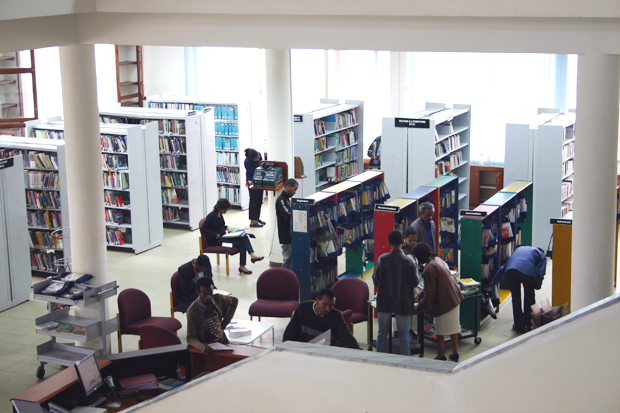Book culture in decline

Tekleyohannes Desta, a returnee from Europe, has always wondered what would change the attitude of the people towards reading.
Having lived in Germany for 23 years, he found quite an extraordinary young generation that lacks the habit of reading. Despite the massive developmental activities he has observed throughout the capital and other major towns, he remains relatively unmoved by such a phenomenal construction boom. “I’ve never been skeptical about these remarkable activities but it does mean nothing without an informed and learned public,†he says. Wishing his compatriots would read more, like he experienced while he was in Europe. “It’s very common to find someone reading while traveling, having a cup of coffee or lying in bed,†he says. He reiterates that he would contribute as much as he can to support campaigns aiming at fostering reading habits in the country. “I’m planning to work on that and move on to join individuals and institutions too,†he promises.
The habit of reading can be a lifelong gift for children, according to academicians, however, it is quite obvious that the culture of reading books is declining. Indeed, technological advancements and spending more time online could have aggravated the situation. Reading is believed to be an indispensable tool of learning. The innumerable problems of the developing world can also be related to this vital input for development and prosperity. Ethiopia is undoubtedly one of those developing countries where the reading culture is so poor, according to various literatures. For many, these days, younger generations seem to be more passionate about online activities and what people like Oumer refer to as “different exotic trends.†“My kids are barely interested in reading newspapers I bring home. They would like to spend their spare time on movies and video games,†Oumer Seid, a father of three said. This may not be a typical Ethiopian family as a number of developing nations are going through the same experience elsewhere in the world. Nevertheless, this might be a tougher problem to overcome for a developing nation whose citizens have a reading free activity away from office or business, commentators argue.
The National Archives and Library Agency of Ethiopia finds itself pretty concerned that only 1.4 million people visit the country’s largest reading and research center every year. “We had quite a disastrous record before and it’s yet to be overcome as we are still having 4000 people to serve every day,†Endalew Adam, Public and International Relations Head of the Agency told The Reporter.

Read more at: The Reporter



